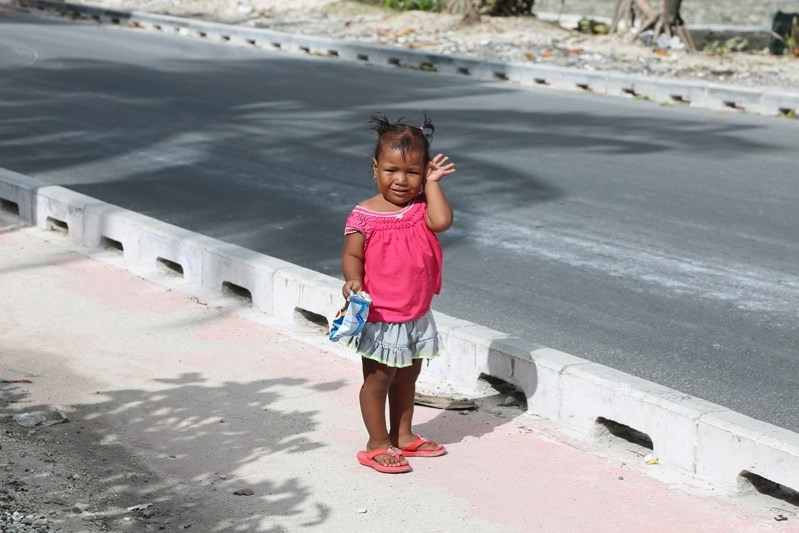As Innisfail-area farmers, my husband Vern and I worry about drought and hail but never about having to leave our land because of flooding.
Last February I travelled to the central Pacific Ocean island of Kiribati with my brother Eric Sorila and met residents who will lose their homes and land because sea levels are rising.
Kiribati is a tiny republic nation of 33 island atolls that together measure only 811 square kilometres. It is the first country in the world facing migration due to global warming. In fact, it has been labelled the world's “poster child of global warming.”
When Eric and I were planning our backpacking trip to Tarawa, the capital of Kiribati, I remember looking at the map and feeling uneasy about the small spit of land in the middle of an infinite ocean.
What would our idyllic Pacific island look like, as it was about to sink? We were to find out this is not only threatening Kiribati but many other ocean atolls.
During the last 10 years, ocean levels have risen 13 centimetres. President Anote Tong has warned his people the islands will be covered in water within the next 30 to 60 years. The increasing frequency and severity of king tides and high winds have already forced entire villages to move, and residents – known as I-Kiribatis -- have become increasingly worried about their futures.
Erias Reebo, a policeman who is the president's bodyguard, showed us where his childhood home once stood. Both his parents are gone. Reebo tells us about the Kiribati custom of making room in a grave when a family member dies. Reebo buried his seven-day-old son a few years ago, first digging up the bones of his parents and then carefully washing and drying them. Safe in a clean container, the bones were then replaced in the grave. Our policeman friend is visibly shaken as he asks us how leaving ancestral graves can be respectful. There's a sinking feeling in my stomach as I imagine what he means.
During a bus excursion on our journey we ask a local lady what she thinks of having to leave Tarawa. Her answer is poignant. “How can I even think about the future when I worry about our family's next meal?” she said.
The bus stops before the badly corroded Buota Bridge, which joins South and North Tarawa. Built by Australian, Canadian and American engineers in 2009, the bridge is already corroding because of the humid, salty air. When we get off, rain droplets begin to splatter and then the heavens open. There is no shelter. We try to duck under a coconut palm. A woman named Colleen calls out from behind some green fronds, “Mauri (hello), please come out of the rain. You can stay in our home”.
Colleen's home is a kia-kia, built on stilts made of pandanus wood. A thatched roof made of coconut fronds keeps the rain out. We pull our wet backpacks off as our hostess invites us to lounge on the raised floor of her kia-kia.
“We inherited this land from my father,” our hostess comments. Thoughts of having to leave home make her sad. “Where would we go?” she asks. Colleen tells of the work her dad put into this land in reclaiming it. Today's massive tides are threatening to wash away what grandfather built -- property that has been in her family for generations.
Paradise is literally losing ground, and the island country's leaders are preparing for the worst.
Choi Yeeting, the climate change coordinator for Kiribati, said his nation has purchased 6,000 acres of land on Vanua Levu, one of the Fijian islands that is 3,000 kilometres away. The new lands will provide a place for his people to resettle. Yeeting knows recent tides have threatened wells with salt water. He is encouraging rainwater catchment. The European Union and Australia have helped in providing rain catchment barrels. Fresh water ‘lenses' in North Tarawa provide clean water for South Tarawa, but these pools are in danger. Squatters living on the protected land surrounding the pools endanger these ponds of fresh water floating on sea water.
We also meet George McKenzie, legal advisor to the parliamentarians of Kiribati, and he tells us about the annual government-organized lottery. Citizens are invited to put their names on a list from which 1,000 names will be drawn. Upon assuring officials that one has secured a job in New Zealand, a passport is immediately granted and the family begins a new life.
Meanwhile Reebo, who has travelled all over the world to climate conferences, knows how rough the road ahead is for his people, but he's optimistic his people will brave this new storm like they have every other one.
The land, their paradise, may sink. But the I-Kiribatis will not drown.
Mirjam Rand is a longtime Innisfail-area resident and the author of American Monuments-The Stories behind our Icons, available from Xlibris
Mirjam Rand, Innisfail area writer
"Erias Reebo, a policeman who is the president's bodyguard, showed us where his childhood home once stood. Reebo tells us about the Kiribati custom of making room in a grave when a family member dies. Our policeman friend is visibly shaken as he asks us how leaving ancestral graves can be respectful. There's a sinking feeling in my stomach as I imagine what he means."



